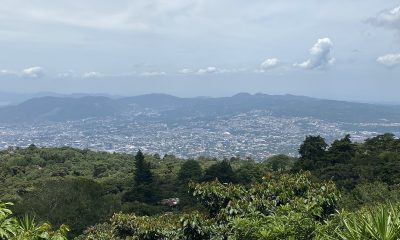Argentina
Argentina’s transgender community confronts ‘chaotic, desperate’ situation
President Javier Milei has implemented several anti-trans directives

Editor’s note: Washington Blade International News Editor Michael K. Lavers will be on assignment in Argentina through April 12.
BUENOS AIRES, Argentina — A group of Argentine transgender activists with whom the Blade spoke on April 4 said President Javier Milei’s policies have made their community even more vulnerable to violence, discrimination, and poverty.
“The situation is really chaotic, desperate,” said Florencia Guimares García, a travesti activist who is president of the House of Lohana and Diana Civil Association. “There is also a lot of fear among the trans and travestí community towards the government’s policies.”
Guimares’s group is named after Diana Sacayán, a prominent trans activist who was stabbed to death inside her Buenos Aires apartment in 2015, and Lohana Berkins, the founder of the Association for the Fight for Travesti and Transsexual Identity who died in 2016.
Guimares and three other trans activists — Julia Amore, Sasha Solano, and Daniela Ruiz — spoke with the Blade after they participated in a trans and travestí rights forum that took place at an LGBTQ cultural center in downtown Buenos Aires. Alba Rueda, the country’s former special envoy for LGBTQ rights, also took part.
“We are in a bad moment for the rights and quality of life of LGBTQ+ people,” Rueda told the Blade during a February 2024 interview.

Milei took office on Dec. 10, 2023, after he defeated then-Economy Minister Sergio Massa in the second round of that year’s Argentina’s presidential election. Rueda resigned before Milei assumed the presidency.
Milei, an economist and former congressman, shortly after he took office eliminated the country’s Women, Gender and Diversity Ministry.
Milei last year closed the National Institute Against Discrimination, Xenophobia and Racism, a government agency known by the acronym INADI that provided support and resources to people who suffered discrimination based on sexual orientation, gender identity, and other factors. Milei in 2024 also dismissed trans people who the government hired under the Trans Labor Quota Law, which set aside at least 1 percent of public sector jobs for trans people.
Argentina’s landmark Gender Identity Law that, among other things, allows trans and nonbinary people to legally change their gender without medical intervention, took effect in 2012 when Cristina Fernández de Kirchner was president. Milei on Feb. 5 issued a decree that restricts minors’ access to gender-affirming surgeries and hormone treatments.
Gay Congressman Esteban Paulón, a long-time LGBTQ activist, filed a criminal complaint against Milei after he linked the LGBTQ community to pedophilia and made other homophobic and transphobic comments during a Jan. 23 speech at the World Economic Forum in Davos, Switzerland. Millions of people in Buenos Aires and across Argentina participated in marches against Milei that took place less than two weeks later.

Milei is among the heads of state who attended President Donald Trump’s inauguration. Milei also spoke at this year’s Conservative Political Action Conference in National Harbor, Md.
“Violence is more explicit, more common,” Guimares told the Blade, noting police violence has become more common against sex workers who are trans or travestí since Milei took office. Guimares added this situation is worse outside of Buenos Aires.
“The situation is different, depending on the location, and even more so in other provinces,” she said. “Even living in the province of Buenos Aires isn’t the same as living in Salta, or in Jujuy, or in Corrientes, or in provinces where the population is more conservative, where the discourse from the churches is much stronger, where all of this has a much crueler impact.”
“Milei’s discourse has legitimatized all of this,” added Guimares.
Amore said Argentina before Milei “had been a beacon” for human rights around the world.
“We’ve been building these laws with a lot of struggle, a lot of effort, with allies, and it wasn’t enough because we didn’t reach our goal,” she said. “These are very young. Our democracy is very young; we have a 40-year-old democracy and we are talking about a Gender Identity Law that is 12-years-old.
Amore added Milei is trying to erase trans and travestí people. Ruiz, an activist and actress who founded Siete Colores Diversidad, agreed.
“It is a cultural battle for us,” Ruiz told the Blade, referring for the continued struggle for trans and travestí rights in Argentina.
“It marks a cultural paradigm shift that we were carrying out day after day, making ourselves visible,” she added. “We carried it out by making ourselves politically visible, by presenting our travestí and trans Latin American visibility as a beacon to the world.”
The activists spoke with the Blade less than three months after Trump took office.
The American president, like Milei, has targeted the trans community with executive orders and policy directives. These include banning the State Department from issuing passports with “X” gender markers and prohibiting trans adults and young people from sports teams that correspond with their gender identity.
Solana, a trans woman from Peru who advocates on behalf of migrants, noted one of the first executive orders that Trump signed directed the federal government to only recognize two genders: Male and female.
“Man and woman. Period,” she said.
Guimares added Milei’s anti-LGBTQ discourse isn’t even his “original speech, but rather a line drawn from the U.S. government of Donald Trump and its agenda, which he established from the beginning and which he campaigned on as well.”
“This also follows in line with parties like Vox in Spain and other European countries, where we see how in Hungary, where an LGBTI Pride march (in Budapest) is now banned, and in other countries around the world where the population is having a really hard time,” said Guimares. “So, it’s not something original from Milei, but rather he’s taking part in those political agendas to generate strategies and alliances to be able to access economic resources.”
Amore, for her part, urged her American counterparts to continue the fight.
“Don’t let down your guard,” said Amore. “Organize. Come together. Speak out. Become visible in community. Respect the diversity of voices and put your own voices first and make yourselves more visible.”
Argentina
Millions march against Javier Milei in Argentina
Protests took place after president’s comments at World Economic Forum

Millions of people in Buenos Aires and across Argentina participated in marches against President Javier Milei in response to his controversial comments at the World Economic Forum in Davos, Switzerland.
The Buenos Aires march, led by LGBTQ+, women’s and human rights organizations in Argentina, shaped up to be one of the largest demonstrations against Milei since he became president in December 2023. The mobilization is a direct response to Milei’s disparaging comments about feminism, LGBTQ+ rights, and other progressive movements.
Milei called “wokism” and “gender ideology” harmful during his Jan. 23 speech at the World Economic Forum, even comparing them to pedophilia. These statements sparked outrage across Argentina with protesters demanding the defense of human rights and equality.
María Rachid, president of the Argentine LGBT+ Federation, told the Los Angeles Blade on Sunday “the march was massive, a strong message to President Milei putting a limit to hatred, discrimination and violence.”
“Argentine society built the values of respect for diversity, equality, and true freedom and yesterday it came out to defend them with massive demonstrations throughout the country and in many cities around the world,” said Rachid. “We are proud of what we were able to build because although they want to destroy it, it is already part of the heart of Argentine society.”
The Buenos Aires march began at the National Congress and ended at the Casa Rosada, the seat of the country’s presidency. Thousands of demonstrators, many with rainbow flags and banners that read “rights are not negotiable,” expressed their strong rejection of Milei’s policies.
Gay Congressman Esteban Paulón highlighted to the Blade “the call for the march was impressive.”
“I think it exceeded any forecast, not only because of the massiveness in the City of Buenos Aires, where it is estimated more than a million people, but also because of the massiveness in the 150 cities in which it was held throughout the country,” he said. “The truth is that it was a very, very big march in Rosario, in Córdoba, in Santa Fe, in Mar del Plata, in Bariloche, in the north, in Salta.”
“There was no expectation that it would be so, so massive, beyond the one in Buenos Aires, which had had an important call, an important visibility, which had added several actors,” added Paulón.

Sofía Díaz, a transgender woman who worked as a civil servant before Milei’s administration fired her, marched in Corrientes, a city in Chaco province.
“After President Milei’s speeches in Davos, the next day we started texting each other on WhatsApp,” she said, referring to public employees at the national level. “We were really afraid of what he had said.”
Activists around the world expressed solidarity with their Argentine counterparts.
Marches took place in cities around the world — including in Santiago, Chile; Montevideo, Uruguay; Rio de Janeiro; São Paulo; Mexico City; London; Madrid; Amsterdam; Berlin; Geneva; Paris; New York; Lisbon, Portugal; and the Spanish cities of Barcelona and Granada.
The Movement for Homosexual Integration and Liberation, a Chilean LGBTQ+ rights group, on Feb. 1 organized a march to the Argentine Embassy. Activists delivered a letter that expressed solidarity with the LGBTQ+ community and repudiated Milei’s policies against it.
Argentina
Gay Argentine congressman files criminal complaint against Javier Milei
President made anti-LGBTQ+ comments during World Economic Forum speech

Argentine President Javier Milei is facing a new controversy after he made a series of homophobic and transphobic comments at the World Economic Forum in Davos, Switzerland.
Congressman Esteban Paulón, a long-time LGBTQ+ rights activist, in a criminal complaint he filed argues the president used discourse that promotes negative stereotypes, and encourages violence against the LGBTQ+ community.
Milei in his Jan. 23 speech made statements that linked the LGBTQ+ community to pedophilia, specifically citing the case of a gay couple in Georgia sentenced to life in prison last year after they pleaded guilty to sexually abusing their two adopted children. Milei also claimed 5-year-old children undergo gender-affirming surgeries, an argument that experts have categorically denied.
These statements sparked national and international outrage.
“Milei radicalizes hate speech based on lies and fabricated truths,” said Paulón in an exclusive interview with the Los Angeles Blade. “He raises harmful stereotypes against the LGBTQ+ community, which generates fear and anguish in our communities. We have filed a criminal complaint, understanding that his statements constitute several crimes aggravated by his presidential investiture.”
Paulón also highlighted the societal impact of Milei’s words, noting many LGBTQ+ families live in fear of having their rights revoked.
“There are fathers and mothers afraid of being denounced for allowing their children to express their gender identity. LGBTQ+ couples fear that their children will be taken away from them,” said Paulón. “This type of discourse activates ultra-conservative groups that politically support Milei, but do not reflect the feelings of the majority of Argentine society.”
LGBTQ+ activists and human rights groups in Argentina have organized a march in Buenos Aires, the country’s capital, that is scheduled to take place on Feb. 1. The event’s slogan, “for a country without hate,” seeks to highlight their rejection of Milei’s statements and a reaffirmation of their commitment to defend LGBTQ+ rights.
Milei, for his part, denied the accusations in a recent interview, pointing out they are part of a campaign that so-called elites have orchestrated.
“I never compared homosexuals with pedophiles, but certain sectors mount these campaigns to generate indignation,” he said.
Paulón stressed his complaint also seeks to have a broader impact on Argentine society.
“Beyond the judicial outcome, we want to open a space for reflection on the importance of not validating hate speech,” he said. “These attacks not only affect a community, but also damage social cohesion and mutual respect.”
Milei has rolled back several LGBTQ+ rights initiatives since he took office in December 2023.
One of his administration’s first acts was to close the Women, Gender and Diversity Ministry and the National Institute Against Discrimination, Xenophobia and Racism, which was known by the acronym INADI. Milei has also dismissed transgender people from public sector jobs.
Argentina
Javier Milei rolls back LGBTQ+ rights in Argentina during first year in office
Gay congressman, activists lead resistance against president

Javier Milei’s rise to power marked a sea change in Argentine politics that profoundly impacted the country’s LGBTQ+ community.
His first year in office has seen a combination of hostile rhetoric and concrete measures that have dismantled historic advances in human rights.
“Javier Milei’s administration is fighting a two-way battle,” Congressman Esteban Paulón, a long-time LGBTQ+ activist, pointed out to the Washington Blade. “On the one hand, symbolically, with an openly homo, lesbo and transodiant discourse, and on the other, in concrete facts, such as the closure of the Ministry of Women, Gender and Diversity, and INADI (the National Institute Against Discrimination, Xenophobia and Racism).”
The decision to eliminate these key institutions sent a clear message: Diversity policies are no longer a state priority. This dismantling left LGBTQ+ Argentines without national advocacy tools.
Some provinces have tried to fill this void, but many others have followed the national government’s lead. This trend, according to Paulón and other activists, has left LGBTQ+ Argentines even more vulnerable.
“What we are seeing is not only a setback in public policies, but also a direct attack on the dignity of thousands of people who, until recently, felt the support of the state,” said Paulón.
One of Milei administration’s first acts was to close the Women, Gender and Diversity Ministry and INADI. These decisions, which Milei said was necessary to reduce “unnecessary public spending,” eliminated agencies that played an essential role in the promotion of human rights and the fight against discrimination.
“Without these institutions, the LGBTQ community has been left unprotected against violence and prejudice. Now, discrimination cases that used to be handled by INADI end up shelved or without follow-up,” Paulón warned. “The message this sends is that our lives don’t matter to this government.”
Paulón and other activists say one of the Milei government’s most alarming decisions is to allow employers to fire employees without legal consequences.
“Today, a person can be fired because of their sexual orientation or gender identity, without the possibility of recovering their job,” warned Paulón.
The new policy has left many employees — especially transgender people — without legal recourse. Advocacy groups say companies have taken advantage of this regulation to carry out selective firings. The freezing of a trans-specific labor quota has deepened employment discrepancies for one of the country’s most vulnerable communities.
Paulón told the Blade that anti-LGBTQ+ rhetoric from Milei and several of his ministers has also had an effect on Argentine society.
“Today, anyone feels they can say anything without consequences,” said Paulón, who noted that ultraconservative and religious sectors view Milei’s government as an ally.
This rhetoric, according to Paulón, has yet to translate into widespread violence.
“We are not yet in a situation of systematic violence as in other countries, but the risk is there,” he said. “Every word of hate from power legitimizes violent actions.”
Congress, civil society leads resistance
In the face of this adverse scenario, resistance has taken various forms.
Paulón and other opposition lawmakers have worked on bills to protect LGBTQ+ rights and reverse regressive measures.
“We will not stand idly by. We put forward concrete proposals to guarantee access to health care, inclusive education and labor protections,” said Paulón.
Activists have strengthened alliances with their counterparts in neighboring countries, such as Brazil and Chile, and Mexico. They are also working with international organizations that have expressed concern about the situation in Argentina.
Although the outlook is bleak, Paulón said he remains hopeful.
“Milei is going to pass, like all processes in democracy,” he said.
Paulón stressed that marriage equality and the transgender rights law are deeply rooted in Argentine society, and act as barriers to stop further setbacks. The challenge now, he says, is to maintain resistance, organize the community, and strengthen international ties.
“We have an organized movement, tools to defend ourselves and a mostly plural and diverse society. This process will also come to an end,” said Paulón. “In this context, the struggle for LGBTQ rights in Argentina is a reminder that social conquests are never definitive and that resistance is vital to preserve the achievements made.”
-

 Opinions3 days ago
Opinions3 days agoGay for pay: Andy Lee and the changing face of content creation
-

 a&e features2 days ago
a&e features2 days agoNo longer just a go-go dancer, Prince Joshua debuts ‘Crowned’ EP
-
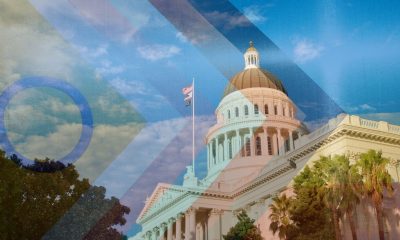
 Opinions3 days ago
Opinions3 days agoWhy is it important for cities to become LGBTQ sanctuary cities?
-
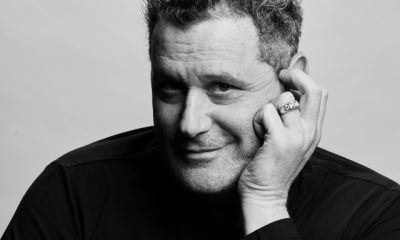
 a&e features3 days ago
a&e features3 days agoFashion icon Isaac Mizrahi brings performances to the West Coast
-
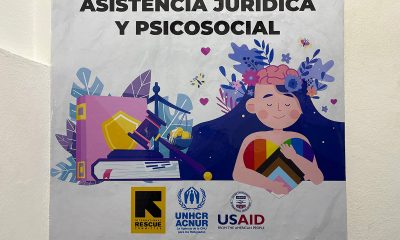
 Noticias en Español4 days ago
Noticias en Español4 days agoSuspensión de fondos de USAID golpea con fuerza a grupos LGBTQ+ en El Salvador
-

 Features1 day ago
Features1 day agoFinding love in queer Los Angeles with matchmaker Daniel Cooley
-

 Arts & Entertainment1 day ago
Arts & Entertainment1 day agoLA Opera brings back Pride Night for ‘Ainadamar’ production
-

 Noticias en Español23 hours ago
Noticias en Español23 hours agoINDIGNACIÓN: ¡El transfeminicidio de Sara Millerey en Colombia nos cuestiona como sociedad!
-
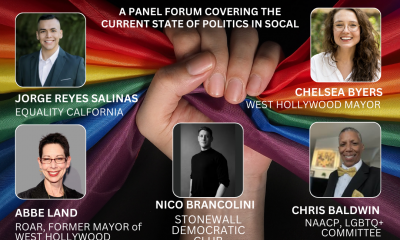
 Features8 hours ago
Features8 hours agoLos Angeles Blade kicks off Free Community Event Series with an informative political panel of government and advocacy group leaders



